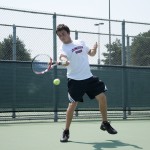Summer break is a time usually filled with the thought of freedom, a chance to unwind from the trials and tribulations of assignments and genuinely get a dose of “me” time. But while this may be a much sought after time for any student, it’s a nightmare for a coach. Many are left wondering if their new pupil will fill his free time with daily weight regiments or opt out in favor of a diet centered off recipes from Epic Meal Time.
Training camp is usually the first line of defense for coaches, offering a coach the ability to better assess his players and their state of conditioning.
“Most of our athletes I’d say ‘let up’ in the summer,” explains tennis coach Glen Moser. “Each season you’re usually starting over again.”
Structured around the building of stamina and endurance, training camp is a great tool for coaches in conditioning players to their routine shape. While the elements of each training camp differ between the different campus clubs, they all focus on both physical and mental conditioning.
“In many aspects, you don’t have a chance to see all the athletes twenty-four seven or 365, so what training camp does is allow them to continue staying fit and staying mentally ready for the season,” said men’s soccer coach Fatai Ayoade. “Training camp is an essential tool that allows the athletes to have the flow of continuing and not lag behind.”
Along with being in top physical shape, proper conditioning also can give the athletes that extra punch of confidence. While this usually goes without saying, a player who comes into training camp thoroughly conditioned is able to build that confidence in the coaches system early, helping them to succeed at a quicker rate as the season progresses.
“Some people just don’t realize the importance of training camp,” said student Michael Ericson. “I know it’s certainly helped me become a better player following a lazy summer.”
Training can include motion drills that help players achieve the general feel of each play. By going through the plays without the use of equipment, players can mentally condition themselves to perform the proper movements.
“We’re really working on movement and body weight, and then you hit the ball,” said Moser. “We may go 20 minutes where they won’t hit the tennis ball, but they’re going through the motion of what we like to call ‘shadow tennis’ and ‘shadow footwork’.”
As the players begin to “go through the motions”, they’re able grasp the sets early and switch into them during play subconsciously. It’s a concept continually stressed through camp; one coaches know will contribute to their athletes performance following each set. Whether through structured in-game-scenarios or mental preparation, training camp is an essential part of any team wishing for a successful season.
Moser looks at proper conditioning in training camp as a vital need for his players to improve: “Our old strength coach, [Steve] Javorek used to say if you have two athletes of equal skill, which one is going to win? And he says, ‘The one in better condition.’ “It’s as simple as putting down the bad habits and replacing it with an open attitude.
Contact Dillan Straight, sports editor, at [email protected].























